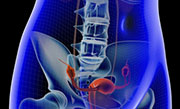- 7 Best Breads for Maintaining Stable Blood Sugar
- Gelatin vs. Collagen: Which is Best for Skin, Nails, and Joints?
- The Long-Term Effects of Daily Turmeric Supplements on Liver Health
- Could Your Grocery Store Meat Be Causing Recurring UTIs?
- Are You Making This Expensive Thermostat Error This Winter?
- Recognizing the Signs of Hypothyroidism
- 10 Strategies to Overcome Insomnia
- Could Artificial Sweeteners Be Aging the Brain Faster?
- Techniques for Soothing Your Nervous System
- Does the Water in Your House Smell Funny? Here’s Why
Woman Gives Birth Using Ovary Tissue Frozen in Childhood


In what researchers are hailing as a medical breakthrough, a 27-year-old woman gave birth to a healthy baby conceived from ovarian tissue that had been surgically removed and frozen when she was a child.
Although this procedure has been used in adults, it wasn’t clear if freezing immature ovarian tissue would be able to successfully restore fertility later.
The researchers said this procedure could be an important advancement for preserving fertility for young women or girls who need disease treatments that might destroy their ovarian function, such as cancer.
“This is a message of hope for all the children with high risk of premature ovarian failure to improve their future quality of life,” said lead researcher Dr. Isabelle Demeestere, a gynecologist and research associate in the Fertility Clinic and Research Laboratory on Human Reproduction at Erasme Hospital, and the Universite Libre de Bruxelles in Brussels, Belgium.
Dr. Avner Hershlag, chief of the Center for Human Reproduction at North Shore University Hospital in Manhasset, N.Y., called the announcement “an exciting event and a landmark achievement in fertility preservation for women at risk of losing the potential to get pregnant.” Hershlag was not involved in the study.
“We have already been able to preserve fertility in young women diagnosed with cancer and other severe medical illnesses where treatment threatens reproductive potential,” he said, adding that women who have a partner can freeze embryos, and single women as young as 14 can freeze their eggs.
But children and teenagers before puberty can’t have eggs frozen, and therefore this treatment offers an alternative, Hershlag said.
“This is a natural extension of science that has already been developed to optimize freezing techniques of eggs, embryos and ovarian tissue. The ovarian tissue . . . may remain frozen for many years, thus giving hope to children who have survived cancer and other serious illnesses, and allow them as adults to have a family,” he said.
The study findings were published June 10 in Human Reproduction.
The woman was born in the Republic of Congo, and diagnosed with sickle-cell anemia as a young child. At 11 she emigrated to Belgium and was treated with a bone marrow transplant. Part of the transplant procedure involved using chemotherapy to disable her immune system, which could permanently prevent her ovaries from functioning. In an attempt to save her future fertility, doctors removed her right ovary when she was 13 and froze tissue fragments.
Although the bone marrow transplant was successful, complications arose and the woman’s remaining ovary failed. When she wanted to have a child 10 years later, doctors thawed some of the frozen ovarian tissue, and transplanted it into her body.
The transplanted tissue responded to her hormones. She started menstruating five months later, and continued to have regular menstrual cycles.
In November 2014, when she was 27, she delivered a healthy boy weighing 6.9 pounds, the researchers said.
The woman’s ovary continues to function normally and there is no reason why she could not have more babies if she wants to, Demeestere said.
“This procedure is feasible and efficient in children,” she said.
Should the graft stop working, the patient could have a second transplant with the remaining frozen tissue, she added.
Demeestere said that further research is necessary. This young woman had started puberty, although she hadn’t yet begun menstruating. So, it’s not clear yet that this procedure would be successful in girls who hadn’t begun puberty at all.
More information
Read about fertility and cancer treatments from the American Cancer Society.
Source: HealthDay
Copyright © 2026 HealthDay. All rights reserved.










